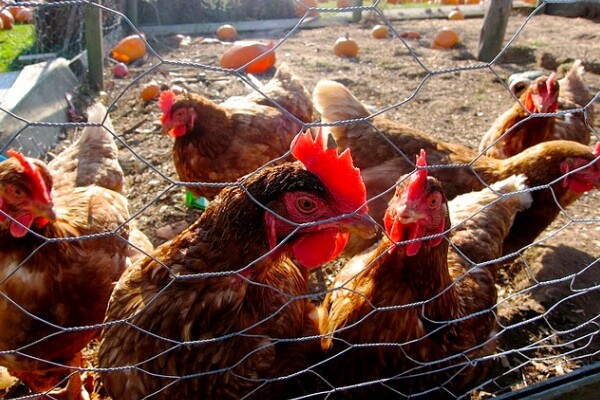How to Fix Chicken Farms

There's a bit of a Holiday News Lull that happens every year between late December and early January. PR reps are using up the miles they accrued over the year to get out of dodge, reporters are taking time away from pestering their sources to spend time with their families, and the general public simply has less time to news gather, what with all the gifts that need buying and turkeys that need to be stuffed. It's not exactly a full shutdown, but it is enough of a scaling down that it's generally a great time for people to dump news they don't want to be made into a big thing. (For example, take last year's release regarding the approval of GMO-enhanced salmon.)
However, sometimes news that gets released during the Great Lull is something that those releasing actually do want us to know about. For example, the Pew Organization's in-depth report on chicken farming.
"The Business of Broilers: Hidden Costs of Putting a Chicken on Every Grill," was released on December 20th, meaning it has essentially fallen on ears that were too busy listening to their libertarian uncle drunkenly drone on about the vital need to invest all of your money in gold. The study's main focus is on the relationship between the few giant corporations who control pretty much every aspect of the chicken industry, and the much smaller farmers whose only job is to actually raise the chickens themselves. As the intro highlights:
The industry is dominated by a handful of large corporations that own the birds, feed mills, cooking operations, and transportation networks. These corporations do not, however, raise the chickens. Virtually all of America's broiler chickens are raised by "growers"--individual farmers who operate under contracts with the large processing companies.
A good way to think of the broiler chicken industry is in terms of parents using a surrogate mother to carry their child: The parents are legally in control of what goes on before and after the pregnancy, while all the surrogate does ("all") is incubate the child for nine months. Chicken farmers, then, are essentially surrogates to the processing plants. However, unlike human surrogates who actually get paid handsomely for their services, chicken farmers currently have to foot a large portion of the bill. Chief among the costs: Picking up chicken poop.
Instead of the processing conglomerates sharing the cost of handling the massive amount of excrement, that burden is put entirely on the farmer. (To extend my surrogate mother metaphor a bit, it would be like forcing the surrogate to pay for all of the child's diapers.) It wouldn't be a big problem if the farmers earned enough to take care of it. But as the study points out, 71% of chicken farmers live below the poverty line. Meaning, they have a whole lot more to worry about than what to do with chicken poop. Meaning, if it ends up in our lakes and rivers -- which, the study points out, happens regularly -- that's just the way it has to be.
The solution offered by Pew is simple: Force the corporations to share the cost of the clean-up, and fine them if they don't. Not only does it make sense from an economical perspective, but would also make it safer on us. Start fining corporations heavily for not picking up poop and, well, if it effects their bottom line, they'll find a way to get it done.
And this is just the tip of the iceberg. The study also goes into how contracts are currently written in such a way that farmers trying to be environmentally conscious with are actually financially punished, and how little attention is paid to the close proximity many chicken farms are to one another, a big no-no in regards to waterway contamination.
In other words, now that you're off that holiday break of yours (if not physically, then at least mentally), it's time to catch up on news you missed. And this report is an important place to start.